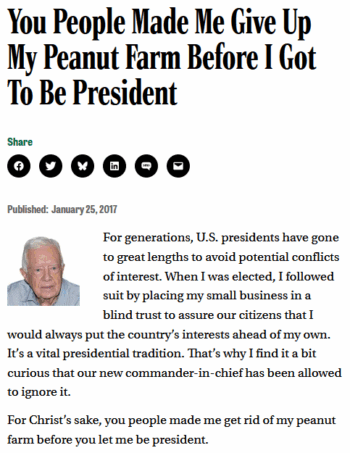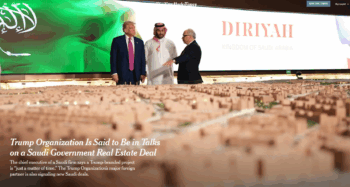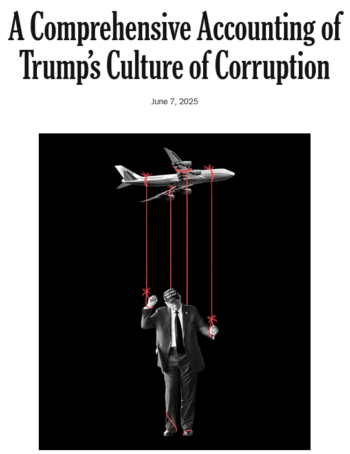
“Jimmy Carter” (Onion, 1/25/17): “Did you worry I might be cutting deals in back rooms with the peanut butter lobby? Or that I might be too busy at harvest time to focus on the economy or the Middle East?”
If any Onion opinion piece fully captures the corruption and venality of Donald Trump’s administrations, it’s one “authored” by former President Jimmy Carter (1/25/17) headlined, “You People Made Me Give Up My Peanut Farm Before I Got to Be President.” To be accurate, the farm was put into a blind trust (USA Today, 2/24/23), but contrasting the urgency of the potential conflicts with Carter’s humble agricultural asset to the unrestrained wheeling and dealing of the Trump machine paints the whole scene.
Trump had barely started his first term when the Onion piece came out, but nearly a year into his second administration, the satirical piece truly illustrates the degree to which the Washington establishment has seemed to accept that there will always be conflicts of interest in the White House, and that Trump’s policies will always be intertwined with his family’s profiteering.
It is a hallmark of corrupt societies that institutions like the media simply accept that payoffs and the personal business interests of politicians supersede public service. A good example of this casual resignation to a corrupt regime came from the New York Times (11/15/25) under the headline “Trump Organization Is Said to Be in Talks on a Saudi Government Real Estate Deal.” The subhead: “The chief executive of a Saudi firm says a Trump-branded project is ‘just a matter of time.’ The Trump Organization’s major foreign partner is also signaling new Saudi deals.”
The front-page report by Vivian Nereim and Rebecca Ruiz focused on Trump’s relationship with Dar Global, his business’ “most important foreign business partner and a key conduit to Arab governments and Gulf companies.” The Times matter-of-factly said that Dar “paid the Trump Organization $21.9 million in license fees last year,” noting that “some of that money goes to the president himself.”
The entire piece, in fact, presented this development in Saudi Arabia with a lackadaisical editorial attitude toward the president using the federal government that he administers as a channel for his family’s businesses, without much commentary from experts about the conflicts of interest. “The Trump Organization is in talks that could bring a Trump-branded property to one of Saudi Arabia’s largest government-owned real estate developments,” it began. It went on to say that “the negotiations are the latest example of Mr. Trump blending governance and family business, particularly in Persian Gulf countries,” without ever raising a question how that “blending” might undermine the presidency.
‘Maybe a little bit clever’

The New Republic (5/13/25) writes that “what is happening now is unquestionably the biggest corruption scandal in American history”—which is not the impression you would get from reading the New York Times (11/15/25) about Trump’s “deal-making.”
Earlier this year, Democratic Sen. Chris Murphy of Connecticut (5/13/25) said after Trump accepted the gift of a $400 million luxury plane from Qatar: “Usually, public corruption happens in secret.” But Trump “isn’t hiding it like other corrupt officials are,” Murphy noted, because “his corruption is wildly public, and his hope is that by doing it publicly, he can con the American people into thinking that it’s not corruption because he’s not hiding it.”
The New Republic (5/13/25) didn’t mince words on Trump’s business in the Gulf: “America Has Never Seen a President This Corrupt,” it announced in a headline, with the subhead, “Trump’s brazen use of the White House to advance his family businesses should be one of the biggest scandals in the country’s history.”
The New York Times reported:
“Nothing announced yet, but soon to be,” Jerry Inzerillo, chief executive of the Diriyah development and a longtime friend of President Trump, said in an interview. He said it was “just a matter of time” before the Trump Organization sealed a deal.
Saudi officials toured the Diriyah development with Mr. Trump during the president’s official state visit in May, with the goal of piquing his interest in the project, Mr. Inzerillo said.
“It turned out to be a good stroke of luck and maybe a little bit clever of us to say, ‘OK, let’s appeal to him as a developer’—and he loved it,” Mr. Inzerillo said.
Next week, Prince Mohammed is expected to make his first visit to the United States in seven years. He hopes to sign a mutual defense agreement with Washington and potentially advance a deal to transfer American nuclear technology to Saudi Arabia.
This is friendly, pro-business portraiture that basically repurposes Trump family public relations for the news page. The report only faintly touched on the ethical, saying that the situation creates a “scenario in which Mr. Trump discusses matters of national security with a foreign leader who is also a key figure in a potential business deal with the president’s family.”
The Times perhaps believes that simply narrating these things, without highlighting their egregious nature, is pushback enough. But it’s well past time for the kind of journalism that raises a lazy eyebrow at blatant corruption.
‘Ordinary in the Gulf’

“Deal-making and diplomacy are increasingly intertwined for Mr. Trump and his family members,” the New York Times (11/15/25) writes, in a formulation Trump would likely embrace.
A related New York Times piece (11/15/25) published the same day by the same reporters carried the headline “A Mideast Development Firm Has Set Up Shop in Trump Tower,” with the subhead: “Dar Global bet big on the Trump name. It is now an essential foreign partner for the Trump Organization.” Ruiz and Nereim in passing admitted that Trump’s Gulf deals “have shattered American norms,” but offered no other commentary about the potential corruption. They gave the last word to the president’s son, Eric, who said, “We have the greatest partners in the world in Dar Global.”
The Times reporters used the same “shattered norms” expression in their other piece that day to indicate that some people in the democratic West might not approve of this kind of governance, but then reminded us that in the oil-rich Wahhabist monarchy, this is just how things are done. “The recent blending of business and politics has shattered American norms,” the article said, adding, “but is ordinary in the Gulf, where hereditary ruling families hold nearly absolute power and the phrase ‘conflict of interest’ carries little weight.”
It also wrote that “Dar would later call finalizing its first Trump collaboration ‘a straightforward but pivotal moment.’”
A keener editor would have seen the problem with nonchalantly passing off the corrupt practices of self-serving theocracy as normal. Saudi Arabia receives an abysmal score of 9/100 on the Freedom House index, and ranks 162 on the Reporters Without Borders press freedom list, behind Cambodia and Turkey.
No journalist can forget that Washington Post columnist Jamal Khashoggi was brutally murdered at the Saudi consulate in Istanbul (Guardian, 10/2/20). The country has a terrible record on workers rights (Human Rights Watch, 5/14/25) and free speech (UN News, 9/15/23). While it has lifted its notorious ban on women driving (BBC, 6/24/18), a coalition of rights groups last year highlighted the “targeting of women human rights defenders, use of the death penalty, lack of protection for women migrant domestic workers, the persistence of a de facto male guardianship system,” and other concerns (Amnesty International, 11/18/24).
‘Likely unconstitutional’

When the New York Times (11/15/25) reports on Trump’s self-enrichment as “blending governance and family business,” it is part of that “culture of corruption” (6/7/25).
The New York Times (3/27/24, 1/17/25, 2/17/25, 5/13/25) has reported on Trump’s potential conflicts of interest in the past. As the Times editorial board (6/7/25) said last spring, Trump
and his family have created several ways for people to enrich them—and government policy then changes in ways that benefit those who have helped the Trumps profit. Often Mr. Trump does not even try to hide the situation. As the historian Matthew Dallek recently put it, “Trump is the most brazenly corrupt national politician in modern times, and his openness about it is sui generis.” He is proud of his avarice, wearing it as a sign of success and savvy.
All of this might spark some curiosity at the Times about Trump’s objectives in the Gulf, and what consequences his policies and personal dealings could have for the broader region. Alas, nothing.
“The whole point of the piece is—or should be—that making multi-billion dollar real estate deals with the Saudis represents a huge conflict of interest that is likely unconstitutional,” said Craig Unger, author of several books on Republican presidents and their ties to corrupt regimes, including the Saudi monarchy. He told FAIR that Trump’s “family is raking in millions, if not billions, from a country that has played a huge role in fostering terrorism and has a history of extraordinary human rights abuses.”
He added, “It’s striking that the Times didn’t bother to interview Richard Painter, the White House ethics lawyer in the George W. Bush administration, or a comparable figure to spell out precisely what those conflicts are.”
In Unger’s view, the Times has shrugged off a glaring crisis of legitimacy.
“Article 1, Section 9, Clause 8 of the Constitution prohibits any US official from accepting titles, gifts, or payments from foreign monarchs or states without congressional approval,” he said. “How is it that they don’t mention the fact that the deal is likely unconstitutional?”
ACTION ALERT: You can send a message to the New York Times at letters@nytimes.com or via Bluesky: @NYTimes.com. Please remember that respectful communication is the most effective. Feel free to leave a copy of your message in the comments thread here.
This content originally appeared on FAIR and was authored by Ari Paul.